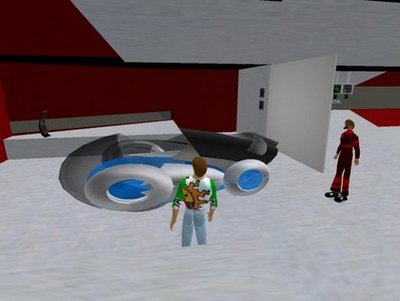Tag: virtual worlds
VWFE: What's the future for virtual worlds?
Phew. We’re at the final session of the Virtual Worlds Forum Europe conference, and my head is spinning from all the ideas buzzing around from the last two days. The final panel should provide a few more, since it’s focused on The Future. Where is all this going, and what will it mean for us punters?
We’re just getting the first William Gibson quote of the session. Who had 5.6 seconds in the sweepstake? Marvellous. First up, the panellists are going to introduce themselves. Professor Richard Bartle from the University of Essex says he co-wrote the first virtual world in 1978. “That’s all I need to say really.”
VWFE: The legal pitfalls of virtual worlds
 Oh my. I’m at the Virtual Worlds Forum Europe still, and it’s about to get hardcore in a legal eagly way. The next panel session is ‘Legal and regulatory issues relating to virtual worlds’. In other words, can you get your avatar arse sued or arrested for something you do in virtualand?
Oh my. I’m at the Virtual Worlds Forum Europe still, and it’s about to get hardcore in a legal eagly way. The next panel session is ‘Legal and regulatory issues relating to virtual worlds’. In other words, can you get your avatar arse sued or arrested for something you do in virtualand?
First up is David Naylor, partner in the technology law group at Field Fisher Waterhouse, which actually has a Second Life office. He says the legal issues range from what exactly an in-world asset is, and who actually owns it (you, or the company that runs the virtual world).
VWFE: Spotlight on five hot new virtual worlds

This is one of the sessions at the Virtual Worlds Forum Europe that I’ve most been looking forward to: five new virtual worlds pitching their wares, or at least introducing themselves. It should be a glimpse at the next generation of virtual worlds, and a chance to see where all this is heading.
So, we start with…
1. HiPiHi (link)
It’s pronounced High-Pee-High by the way, and has been tagged as ‘the Chinese Second Life’, being based in Beijing. “Previously, there’s been no virtual world that’s really catered for the Chinese market and targeted their language barriers,” says presenter Bjorn Lee. “Our vision is to create a virtual world and virtual economy.”
VWFE: IBM on why virtual worlds need to be interoperable
 up at the Virtual Worlds Forum Europe is Paul Ledak, who’s one of IBM’s virtual world gurus. He’s explaining the important (if you’re in the virtual worlds business) of interoperability.
up at the Virtual Worlds Forum Europe is Paul Ledak, who’s one of IBM’s virtual world gurus. He’s explaining the important (if you’re in the virtual worlds business) of interoperability.
He’s kicking off with a personal example: creating a house in a virtual world, with an eye to building it in real life (I think). So, you start with a 2D floorplan design, and have to turn that into a 3D form – maybe via an architect who visualises it for you, in partnership with an interior designer. “At the end of the day, there are many different people involved in putting this together.”
VWFE: BP on how businesses can make the most of virtual worlds
 It’s the second day of the Virtual Worlds Forum Europe conference, so I’m here reporting on all the discussion and debate. There’s a fair amount of sessions on corporate and legal issues today, but also some exciting stuff on new virtual worlds, and the future. Sorry, The Future.
It’s the second day of the Virtual Worlds Forum Europe conference, so I’m here reporting on all the discussion and debate. There’s a fair amount of sessions on corporate and legal issues today, but also some exciting stuff on new virtual worlds, and the future. Sorry, The Future.
First up is Joe Little from BP, who’s talking about ‘evangelising virtual worlds within the corporation’. In other words, convincing your boss why he shouldn’t be scared of Second Life. Apparently BP is gearing up to make the most of the 3D Web / metaverses (they’re still deciding what term to use) next year.
VWFE: Lord Triesman gives the UK government's views on virtual worlds
 I’m sitting here with Kat at the Virtual Worlds Forum Europe conference in London, which has just kicked off with a keynote address by Lord Puttnam, and now we’ve our second Lord keynote of the day, in the form of Lord Triesman, the Parliamentary Under-Secretary of State at the Department of Innovation, Universities and Skills.
I’m sitting here with Kat at the Virtual Worlds Forum Europe conference in London, which has just kicked off with a keynote address by Lord Puttnam, and now we’ve our second Lord keynote of the day, in the form of Lord Triesman, the Parliamentary Under-Secretary of State at the Department of Innovation, Universities and Skills.
He’s the man in charge of government regulation for virtual worlds, in other words. He hasn’t said his Second Life name yet. But he did start by saying virtual worlds are “one of the most exciting technological developments of recent years, and one to which we have to be especially attentive”.
Virtual Worlds Week: Top 10 alternatives to Second Life
You’d be forgiven for thinking Second Life is the only virtual world in town, from the acres of press hype in the last year. And there’s no doubt that Linden Lab’s world has deserved many of the plaudits (and fat marketing expenditure) coming its way, having been arguably the first non-gaming virtual world to excite mainstream attention.
But it’s not alone. Industry body Virtual Worlds Management recently estimated that 35 virtual worlds companies had trousered over a billion dollars of investment in the last year (although that research has since been questioned, with some of those companies not actually being involved in virtual worlds, and $700 million of the figure coming from one acquisition).
Virtual Worlds Week: Five companies who SHOULD launch virtual worlds

The metaverse is an increasingly crowded place, given the number of startups keen to take a slice of Second Life’s hype and revenues. We’ll be profiling some of the main rivals later this week, as well as taking a look at the hot young guns showing their worlds off at the Virtual Worlds Forum Europe conference.
But what about companies who should be launching their own virtual worlds, but haven’t yet? I’ve had a think, and come up with five firms for whom it’d make sense to go virtual. Starting with…
Welcome to Virtual Worlds Week on Tech Digest
Meatspace? Schmeatspace! This week, it’s all about virtual reality here on Tech Digest. To be specific, we’re going to be focusing on all things virtual world related, from Second Life and PlayStation Home to the many startups angling for a slice of your avatar.
Watch out for a bunch of stories looking at the latest virtual world developments, while on Wednesday and Thursday we’ll be liveblogging from the Virtual Worlds Forum Europe conference, where the biggest companies in the area will be showing off their new developments and talking about the latest trends.
The virtual worlds of the future will be built on LIES
Gary Cutlack writes…
There’s a particularly infuriating story up on The Register at the moment, in which virtual world ‘visionaries’ make things up about the future.
Some man reckons that within ten years, something a bit like Second Life will “dwarf the web” and offer an experience that requires “hundreds of millions” of computers to keep it running.



















